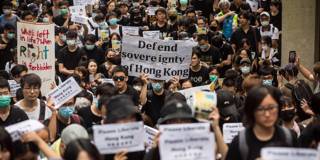China has waited 23 years for “its” security law to prevail in Hong Kong and is unlikely to back down now. That will force the city's residents to make a choice they had long hoped to avoid: either knuckle under, or get out.
LONDON – There was always something illusory about the 1984 Sino-British Joint Declaration that guaranteed the continuation of Hong Kong’s capitalist system and basic freedoms for 50 years after the city’s return to Chinese sovereignty in 1997. The Joint Declaration had been made possible by Chinese leader Deng Xiaoping’s clever “one country, two systems” formula, which enabled the United Kingdom to withdraw, with face-saving grace, from a colonial position it could no longer defend.

LONDON – There was always something illusory about the 1984 Sino-British Joint Declaration that guaranteed the continuation of Hong Kong’s capitalist system and basic freedoms for 50 years after the city’s return to Chinese sovereignty in 1997. The Joint Declaration had been made possible by Chinese leader Deng Xiaoping’s clever “one country, two systems” formula, which enabled the United Kingdom to withdraw, with face-saving grace, from a colonial position it could no longer defend.